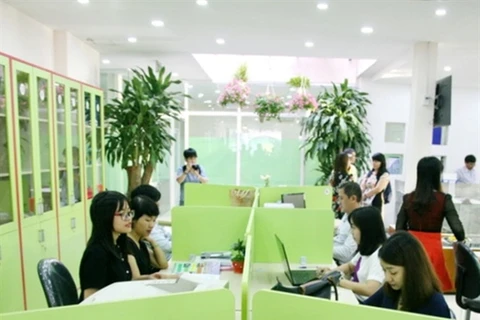HCM City (VNA) - Prime Minister Nguyen Xuan Phuc has green-lighted Ho Chi Minh City’s proposal to spend 67 trillion VND (almost 3 billion USD) raised from equitisation of State-owned companies and sale of their stakes in non-core business for social development.
“HCM City plans to spend the money on medium- and long-term public infrastructure and social projects in 2016 –20,” Pham Phu Quoc, General Director of the HCM City Financial and Investment State-owned company (HFIC), told the Government website baochinhphu.vn.
During the period, the city is expected to need 850 trillion VND (37.5 billion USD) for social development, but is prohibited from mobilising funds for fear of breaching the permitted public debt limit.
With the current debt level, the city can only mobilise another 70 percent of this year’s budget from issuance of bonds and the like.
“The money is small compared with the need,” Quoc said.
“Therefore, the 67 trillion VND package has much significance for the city’s development.”
The Prime Minister has also permitted the HFIC to represent the city in businesses where it owns stakes.
But questions have been asked if money raised from equitisation should not go into the Business Development and Support Fund first and about the legality of appointing the HFIC to manage the money and represent the city on the boards of companies.
Quoc dismissed these concerns, saying, “It is in line with article No. 13 in the 2015 State Budget Law.”
The law says “Local money, which is recouped from economic organisations, shall remain at the local level.”
This model has been run on a pilot basis since 2010 and is considered a success.
“HCM City has sent a report to the Prime Minister about the model and confirmed that HFIC has successfully completed its task of safeguarding and developing State capital resources,” Quoc said.
Tran Vinh Tuyen, Vice Chairman of the municipal People’s Committee, said: “Leaders and experts spent a lot of time to establish the HFIC. The corporation operates as a business and the HCM City People’s Committee directly manages it.”
The strength of the model lies in professionalising the role of the representative of State capital in businesses by applying international governance standards, he added.-VNA
“HCM City plans to spend the money on medium- and long-term public infrastructure and social projects in 2016 –20,” Pham Phu Quoc, General Director of the HCM City Financial and Investment State-owned company (HFIC), told the Government website baochinhphu.vn.
During the period, the city is expected to need 850 trillion VND (37.5 billion USD) for social development, but is prohibited from mobilising funds for fear of breaching the permitted public debt limit.
With the current debt level, the city can only mobilise another 70 percent of this year’s budget from issuance of bonds and the like.
“The money is small compared with the need,” Quoc said.
“Therefore, the 67 trillion VND package has much significance for the city’s development.”
The Prime Minister has also permitted the HFIC to represent the city in businesses where it owns stakes.
But questions have been asked if money raised from equitisation should not go into the Business Development and Support Fund first and about the legality of appointing the HFIC to manage the money and represent the city on the boards of companies.
Quoc dismissed these concerns, saying, “It is in line with article No. 13 in the 2015 State Budget Law.”
The law says “Local money, which is recouped from economic organisations, shall remain at the local level.”
This model has been run on a pilot basis since 2010 and is considered a success.
“HCM City has sent a report to the Prime Minister about the model and confirmed that HFIC has successfully completed its task of safeguarding and developing State capital resources,” Quoc said.
Tran Vinh Tuyen, Vice Chairman of the municipal People’s Committee, said: “Leaders and experts spent a lot of time to establish the HFIC. The corporation operates as a business and the HCM City People’s Committee directly manages it.”
The strength of the model lies in professionalising the role of the representative of State capital in businesses by applying international governance standards, he added.-VNA
VNA
























